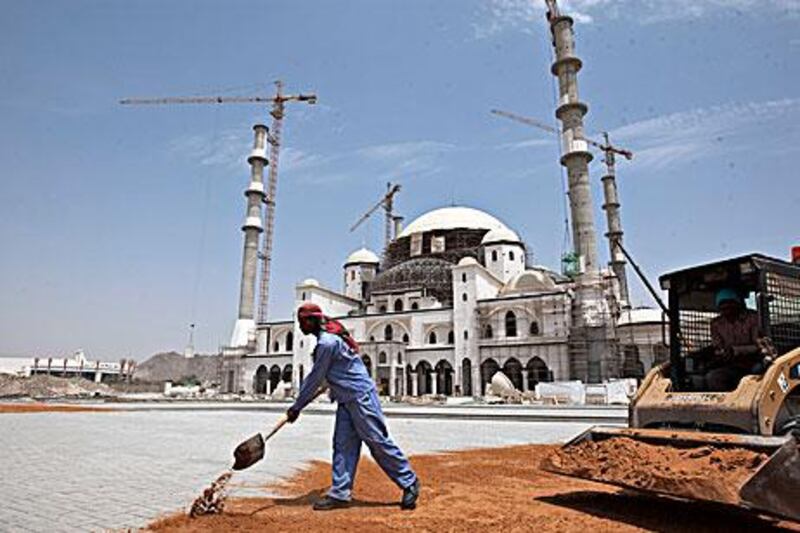FUJAIRAH // Hundreds of men have come together from across the Islamic world to change the Fujairah skyline. Each is here for his own reason, but all are united in faith and work.
The Sheikh Zayed Mosque, which will be the second-largest in the country after Abu Dhabi's, will hold 28,000 worshippers when it is finally complete.
Its builders come from mountain villages, small cities and urban areas. For some, the Ottoman-style mosque is their life's work, a creation "from the blood". For others, it means the "Dubai dollar", as one builder refers to a poster of dollar bills beside his bunk bed.
"This mosque is not for prayer, only for work," said Mohammed Jamshed, a safety inspector who lives on-site with almost 600 others. "When I am working on this mosque, I am working for Allah."
Mr Jamshed, 30, is fresh-faced and quick to giggle when talking with friends. He came to Fujairah in 2007 from "a little village with four mosques" in the restive mountain region of Waziristan, Pakistan.
Babu Masoodrahman, a carpenter, came here for love. Now 25, Mr Masoodrahman has worked since he was 15 to save money for his wedding. He has the fiancée, now he just needs the cash.
"Every day, really, he telephones her," said Mohammed Raqibal, 28, his friend from Dhaka. "It's a love marriage."
Mr Masoodrahman is not overawed by the size of the mosque. When he was in Dhaka, he prayed daily at Baitul Mukarram, a mosque that is 30 metres tall and can hold 40,000 worshippers.
He has helped erect a maze of scaffolding around the Fujairah mosque that is 58 metres tall and fills the entire 10,000 square-metre prayer hall. When it is complete and the scaffolding removed, it will be an empty square hall with just four central pillars, crowned by a dome that is 42 metres in diameter.
"It needs hard work," said Mr Masoodrahman. "When this project is finished I need a holiday."
Ramadan may be a month for spiritual rest and renewal but work continues. Dome tops and minaret spires litter the grounds of the construction site waiting to be hoist into place.
The men count their time in the UAE in months, though many have spent years here since their arrival as teenagers.
Nazrul Islam, 22, a mason from the Natore district of Bangladesh, came to the UAE when he was 18. He preferred his work at Jumeirah and Dubai International City, because the pay was better.
"More money, this is very good," said Mr Islam. "Every Muslim prays, but I am only just labour here. When this finishes, I will go to another site."
The men live beside the great mosque in a collection of metal trailers, each painted sea foam green and crowded with three bunk beds. They pray in a temporary mosque in the camp.
Ramadan is the exception, however. In this month, the 571 men scatter to mosques around the neighbourhood for iftar. They dress in their best collared shirts and hold hands in friendship.
After hours of labouring in the heat, noise and dust of construction, they gathered at mosques and iftar tents. There is complete silence in the minutes before prayer.
Dozens of pairs of sandals and a single bicycle are left outside the Thabit Al Khazraqi mosque, which serves an iftar for about 125. The new mosque, however, will have 3,000 parking spaces and room for 36 tour buses.
The men return to the Sheikh Zayed Mosque after prayers, guided by the lights of the cranes.
The men do not know if they will ever pray inside their creation. "I will be far away but, inshallah, I will come here one time, two times to pray here, inshallah," said Mr Jamshed.
"No problem," said Mr Masoodrahman. "I go where there is money."






